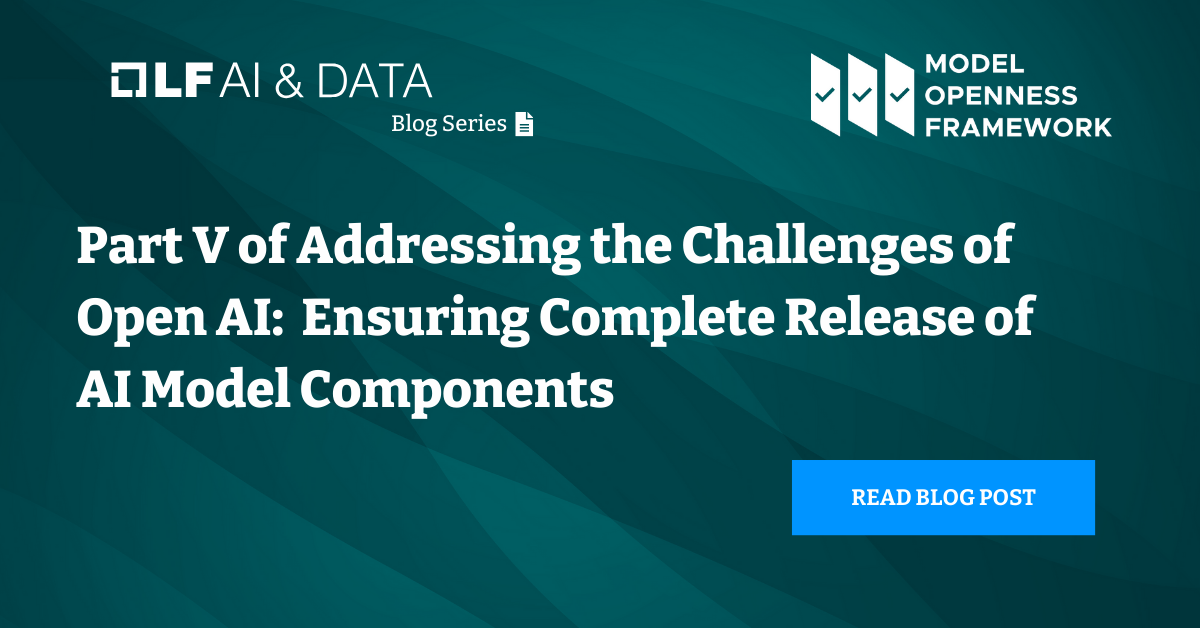
In the final installment of our series “Addressing Challenges in Open AI with LF AI & Data,” we address one of the key challenges in open AI development: the incomplete release of model components. This issue undermines the foundational principles of transparency and accessibility for fostering collaboration and innovation in artificial intelligence (AI). LF AI & Data addresses this with two critical tools: the Model Openness Framework (MOF) and the Model Openness Tool (MOT), designed to ensure a comprehensive and verifiable release of all AI model components.

The Critical Need for Full AI Model Transparency
Throughout this series, we’ve highlighted the many aspects of open AI, emphasizing the critical role of accessibility and transparency in AI development. A recurring theme is the need for full openness, which is often undermined by the selective disclosure of certain model components.
Some models labeled as “open” lack key components necessary for full understanding and reproduction, limiting further development and innovation. To ensure reliability and safety, users and developers need access to all aspects of an AI model. Without full transparency, the community misses out on opportunities to improve or adapt existing AI technologies for new applications.
The Model Openness Framework (MOF)
The MOF addresses this challenge of incomplete AI model releases by mandating the disclosure of all essential components including datasets, source code, model architectures, and trained parameters.
The MOF mandates the release of complete datasets, fully functional source code, detailed model architectures, and trained parameters, ensuring that every essential element for replicating results is openly available. This comprehensive access allows independent replication, critical for identifying errors, biases, and disparities in models, thus improving scientific rigor. Additionally, the framework promotes the release of all model components under permissive licenses, enabling broader adoption and adaptation. This approach not only allows developers to build on existing models without legal or technical barriers but also highlights your role in fostering an environment of open collaboration, making you an integral part of the AI development process.
The framework guides researchers and developers seeking to enhance model transparency and reproducibility while allowing permissive usage to enhance the AI models’ useability and foster an ecosystem where advancements are built on transparent and openly shared foundations.
The Model Openness Tool (MOT)
To operationalize the MOF, the Model Openness Tool offers a structured methodology for evaluating the completeness and openness of AI models. This tool helps developers self-assess their models against the MOF standards and assists users in identifying models that fully comply with open AI principles. The MOT:
- Assesses Model Components: Evaluates whether all necessary components have been released as per MOF guidelines.
- Classifies Openness: Categorizes models based on their level of openness, offering badges to models that meet high standards of transparency.
- Promotes Standard Adoption: Encourages developers to adopt open AI practices by highlighting the benefits of complete openness in model development.

We Invite You to Shape the future
Get involved with the Model Openness Framework (MOF) today and help shape the future of responsible AI development. By participating, you contribute to a movement that emphasizes transparency and equity in AI technologies.
This series has highlighted the critical need for frameworks and tools like the MOF and the Model Openness Tool (MOT). As we look to the future, achieving truly open AI will require ongoing collaboration, innovation, and a strong commitment to transparency and inclusivity in AI development.” — Ibrahim Haddad, PhD, Executive Director, LF AI & Data
Check out previous posts from this blog series below.
- Addressing Challenges in Open AI with LF AI & Data: Introducing the Model Openness Framework and Tool
- Part II of Addressing the Challenges of Open AI: Navigating Open Source Licenses for Non-Software Assets with LF AI & Data
- Part III of Addressing the Challenges of Open AI: Balancing Innovation with Regulation through the Model Openness Framework
- Part IV of Addressing the Challenges of Open AI: Adding Clarity to AI Model Licenses with MOF
LF AI & Data Resources
- Learn about membership opportunities
- Explore the interactive landscape
- Check out our technical projects
- Join us at upcoming events
- Read the latest announcements on the blog
- Subscribe to the mailing lists
- Follow us on Twitter or LinkedIn
